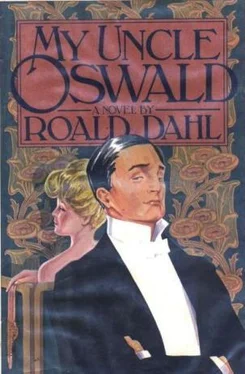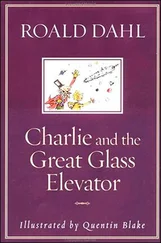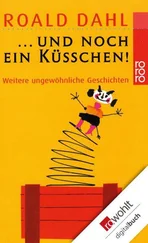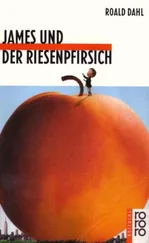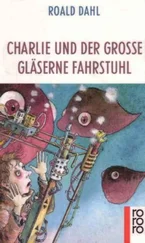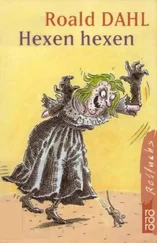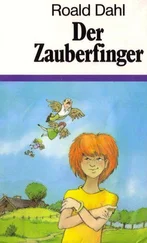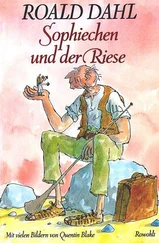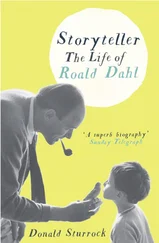Yasmin got out of the car. “This banana’s a bit uncomfortable,” she said.
“Now you know what it’s like to be a man,” I said.
She turned away and strode toward the house with her hands in her trouser pockets. I saw her try the door. It was unlocked, presumably because the place was divided into separate apartments. She went in.
I settled down in the motor car to await the outcome. I, the general, had done all I could to prepare for the battle. The rest was up to Yasmin, the soldier. She was well armed. She carried a double dose (we had finally decided) of Blister Beetle and a long hatpin whose sharp end still -bore the crusted traces of Spanish royal blood which Yasmiri had refused to wipe off.
It was a warm cloudy August evening in Paris. The canvas hood of my blue Citroën torpedo was folded back. My seat was comfortable but I was too fidgety to concentrate on a book. I had a good view of the house and I fixed my eyes upon it with a certain fascination. I could see the large windows on the second floor where Monsieur Proust lived, and the green velvet curtains that were drawn back on either side, but I couldn’t see in. Yasmin was up there now, probably in that very room, and she would be saying, as I had so carefully instructed her to say, “Pray forgive me, monsieur, but I am in love with your work. I have come all the way from England simply to pay homage to your greatness. Please accept this little box of chocolates . . . they are delicious . . . do you mind if I have one . . . and here’s one for you . . .”
I waited twenty minutes. I waited thirty minutes. I was watching the clock. The way Yasmin felt about ‘that little bugger’ as she called him, I reckoned there would be no tête-a -tête and pleasant conversation afterwards, as there had been with Renoir and Monet. This, I reflected, would be a brief sharp visit and possibly a rather painful one for the great writer.
I was correct about its being brief. Thirty-three minutes after Yasmin had gone in, I saw the big black front door opening and out she came.
As she walked toward me, I looked for traces of dishevelment in her clothes. There were none. The snuff-coloured trilby was at the same saucy angle as before and altogether she looked as trim and crisp coming out as she had going in.
Or did she? Was there not a slight lack of bounce in her walk? There was indeed. And was there not a tendency to move those splendid long limbs of hers rather carefully? Unquestionably yes. She was walking, in fact, like a person who had just dismounted from a bicycle after a long ride upon an uncomfortable saddle.
These small observations comforted me. They were evidence, surely, that my gallant soldier had been engaged in fierce combat.
“Well done,” I said as she got into the car.
“What makes you think it was so successful?”
She was a cool one, our Yasmin.
“Don’t tell me it went wrong.”
She didn’t answer me. She settled herself in the seat and closed the car door.
“I have to know, Yasmin, because if you do have the loot I must rush it back quickly and freeze it up.”
She had it. Of course she had it. I rushed it back to the hotel and made fifty exceptional straws. Each straw, according to my microscopic density count, contained no less than seventy-five million sperm. I know they were potent straws because at this very moment, as I write these words nineteen years after the event, I am able to state positively that there are fourteen children running around in France who have Marcel Proust as their father. Only I know who they are. Such matters are great secrets. They are secrets between me and the mothers. The husbands don’t know. It’s a mother’s secret. But my goodness me, you should see those fourteen silly rich ambitious literary-minded mothers. Each one of them, as she gazes proudly upon her Proustian offspring, is telling herself that she has almost certainly given birth to a great writer. Well, she is wrong. All of them are wrong. There is no evidence whatsoever that great writers beget great writers. Occasionally they beget minor writers, but that’s as far as it goes. There is, I think, slightly more evidence that great painters sometimes beget great painters. Look at Teniers and Bruegel and Tiepolo, and even Pissarro. And in music, the wonderful Johann Sebastian had such an overwhelming genius that it was impossible for him not to pass some of it on to his children. But writers, no. Great writers seem to spring more often than not from stony soil—the sons of coal-miners or pork butchers or impoverished teachers. But that simple truth was never going to prevent a small number of wealthy literary-snob ladies from wishing to have a baby by the brilliant Monsieur Proust or the extraordinary Mr. James Joyce. My job, anyway, was not to propagate geniuses but to make money.
By the time I had filled those fifty Proust straws and had immersed them safely in liquid nitrogen, it was nearly nine o’clock at night. Yasmin was now bathed and changed into fine feminine clothes and I took her out to Maxim’s for supper to celebrate our success. She had not yet told me anything of what went on.
My diary from that date informs me that we both started the meal with a dozen escargots. It was mid-August and the grouse were just beginning to come in from Yorkshire and Scotland, so we ordered one each and I told the head-waiter we wanted them blood-rare. The wine was to be a bottle of Volnay, one of my favourite burgundies.
“Now,” I said when we had given our order. “Tell me all.”
“You want a blow by blow account?”
“Every tiny detail.”
There was a bowl of radishes on the table and Yasmin popped one into her mouth and crunched it up. “He had a bell on his door,” she said, “so I rang it. Céleste opened the door and glared at me. You should see that Céleste, Oswald. She’s skinny and sharp-nosed with a mouth like a knife and two small brown eyes that looked me up and down with utter distaste. ‘What is it you wish?’ she said sharply, and I gave her the bit about having travelled from England to bring a present to the famous writer whom I worshipped. ‘Monsieur Proust is working,’ Céleste said and tried to shut the door. I put my foot in it and pushed it open and marched in. ‘I have not travelled all this distance to have a door slammed in my face,’ I said. ‘Kindly inform your master that I am here to see him.’”
“Well done, you,” I said.
“I had to bluff it out,” she said. “Céleste glared at me. “What name?’ she snapped. ‘Mister Bottomley,’ I said, ‘of London.’ I was rather pleased with that name.”
“Apt,” I said. “Did the maid announce you?”
“Oh yes. And out he came into the hall, this funny little pop-eyed bugger, still holding a pen in his hand.”
“What happened next?”
“I immediately launched into the long speech you taught me, starting with, ‘Pray forgive me, monsieur . . .’ but I’d hardly got half a dozen words out when he raised his hand and cried, ‘Stop! I have already forgiven you!’ He was goggling at me as though I were the most beautiful and desirable and spicy little lad he’d ever seen in his life, which I’ll bet I was.”
“Was he speaking in English or French?”
“A bit of each. His English was pretty good, about like my French, so it didn’t matter.”
“And he fell for you right away?”
“He couldn’t take his eyes off me. ‘That will be all, thank you, Céleste,’ he said, licking his lips. But Céleste didn’t like it. She stayed put. She scented trouble.
“‘You may go, Céleste,’ Monsieur Proust said, raising his voice.
“But she still refused to go. ‘You do not wish anything more, Monsieur Proust?’
“‘I wish to be left alone,’ he snapped, and the woman stalked out of the room in a huff.
Читать дальше
